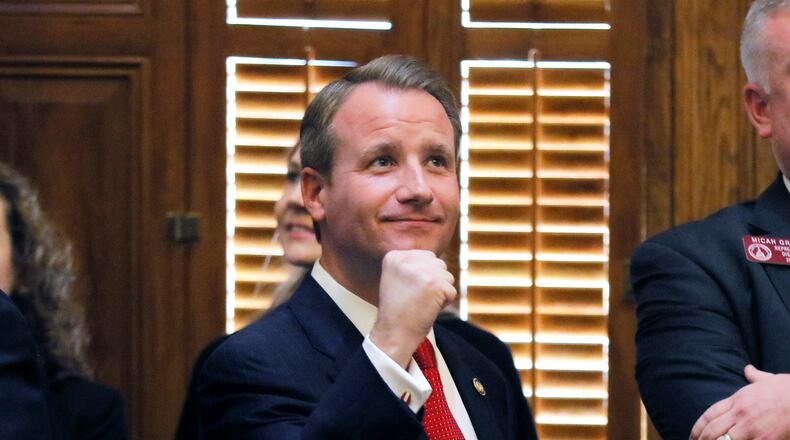Two Georgia Republican lawmakers have lost their day jobs, cut off by their employers in what appears to be retaliation for their support for Republican efforts in the General Assembly to overhaul voting laws in the state.
Earlier this month, Rep. Barry Fleming, R-Harlem, was asked to resign from his role as the attorney for the Hancock County Board of Commissioners.
The board voted unanimously to dismiss Fleming after protestors on the courthouse steps demanded he be fired for his sponsorship of House Bill 531, the sweeping House-passed legislation that would reduce Sunday voting, limit ballot drop boxes, and require a driver’s license or other identification to request an absentee ballot.
In a county where 71% of the voters are Black, commissioners agreed Fleming needed to go.
A week after that, Fleming also endorsed a bill that would expand weekend voting and maintains Sunday voting as an option.
This past weekend, Sen. John Albers, R-Roswell, also lost his job as the chief information officer at Fisher Phillips, a large national law firm with offices on Peachtree Street in Atlanta.
Albers’ dismissal followed a series of now-deleted tweets from the Lincoln Project obtained by The Atlanta-Journal Constitution, which tagged more than a dozen of his firm’s largest clients, including Starbucks, USAA, Walmart, and FedEx.
“These companies currently use @tabor_attorneys, helping pay @johnalbers salary while he sponsors bills to suppress and strip votes away from millions of black Georgians.”
The next tweet pointed to Albers’ co-sponsorship of Senate Bill 62, “a bill meant to suppress black votes & institute a new Jim Crow.”
Unlike Fleming, Albers walked out of the vote on his chamber’s most draconian elections bill, Senate Bill 241, which would have ended no-excuse absentee voting in Georgia.
Instead, SB 62 would require that each ballot be printed with the name of its precinct. It passed the Senate 37 to 15 with the votes of four Democrats. One of those Democrats was Sen. Nan Orrock, D-Atlanta, a progressive you could sooner imagine resigning her seat than supporting a measure that resulted in a Jim Crow-era law.
Despite the nuts-and-bolts content of the bill that the Lincoln Project called out, the Tweets about Albers got more than 20,000 retweets before they were deleted without explanation.
Calls flooded into Fisher Phillips, including from the firm’s clients, and Albers was gone by the next day.
Then the threats against his family began.
“It happened in a matter of 24 hours, all based on a radical group that told a lie,” Albers said in an interview in his office.
In a statement, the law firm told the AJC that Albers’ role as a state lawmaker had become “incompatible” with his role at the firm.
And Albers said he felt sorry that his colleagues were pulled into the mele. “It wasn’t their fault,” he said.
The Lincoln Project is already under fire for its own unsavory behavior. When I asked if the group knew what SB 62 deals with when they called it racist, a spokesman said they only took down the Tweets about Albers “because they didn’t go far enough.”
The group also sent along a lengthy written statement that the Republican Party is “in full panic” after losing to Joe Biden and passing “Jim Crow era voting suppression laws” to make it harder to vote in Georgia.
The term “cancel culture” is overblown these days. If an actor loses a job after offending potential viewers or Twitter takes away Donald Trump’s access after he violated the platform’s terms of service, that is their right as private companies.
But it’s different and dangerous territory when lawmakers are fired from their jobs, or receiving threats against their families, for debating issues and passing laws — after they’ve been elected expressly to debate issues and pass laws.
The place for accountability for elected officials is at the ballot box for voters, and in the financial support companies do or don’t offer for their campaigns. The same holds true for entire political parties.
And so far, the debate process is yielding results for Democrats. Some of the most extreme proposals in the GOP elections bills have been pulled out after vocal public protests at the Capitol and genuine concerns from Democratic lawmakers.
But if House and Senate members lose their livelihoods for public debates, that same decision-making will happen behind closed doors and sane, reasonable people will likely stay away from office in the future.
“I think you’re going to have people who have a lot of talents, and a lot of opportunity to make a real difference and serve who will just shy away from it.” Albers said.
The reality is that there is no better way to guarantee accountability for lawmakers than to keep debates public and votes in open session.
Did you happen to see Sen. Bruce Thompson, R-White, calling his Senate colleagues racist hypocrites on Monday after they called for an end to Asian hate crimes?
“I thought race didn’t matter,” Thompson said. Huh?
Anyone offended by that can make a note to write a check to Thompson’s opponent in 2022, or better yet, run against him yourself.
But Tweeting at a senator, who didn’t even do what he’s accused of doing, only for him to lose his job over it, isn’t the way public discourse or a healthy government in a Democracy should function.
It would be wrong if it happened to Democrats for voting against the bills they believe are deeply flawed and it’s wrong now, too.
About the Author
Keep Reading
The Latest
Featured




